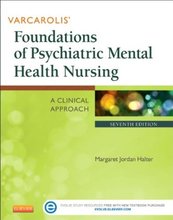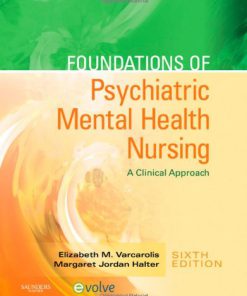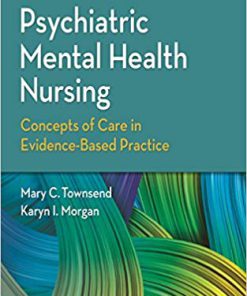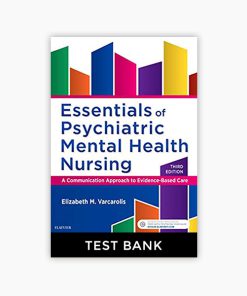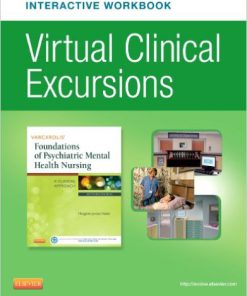Test Bank for Varcarolis Foundations of Psychiatric-Mental Health Nursing 8th Edition by Halter
$35.00 Original price was: $35.00.$26.50Current price is: $26.50.
Test Bank for Varcarolis Foundations of Psychiatric-Mental Health Nursing 8th Edition by Halter
This is completed downloadable of Test Bank for Varcarolis Foundations of Psychiatric-Mental Health Nursing 8th Edition by Halter
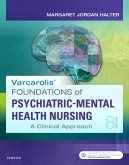
Product Details:
- ISBN-10 : 0323389678
- ISBN-13 : 978-0323389679
- Author: Margaret Jordan Halter
Varcarolis’ Foundations of Psychiatric-Mental Health Nursing, 8th Edition is the most comprehensive RN psychiatric nursing text on the market! Awarded second place in the 2018 AJN Book of the Year Awards in Psychiatric Mental Health Nursing category. User-friendly by design, it simplifies the often-intimidating subject of psychiatric-mental health nursing with a practical, clinical perspective. This edition was revised in conjunction with a readability expert to support clarity and ease of understanding. Chapters follow the nursing process framework and progress from theory to application, preparing your students for clinical practice with real-world examples. New to this edition are full-page illustrated explanations about the neurobiology of disorders and associated medications, criteria from the American Psychiatric Association’s Diagnostic and Statistical Manual of Mental Disorders, 5th edition (DSM-5) for major disorders, completely revised Evidence-Based Practice boxes, and a fully rewritten chapter on Dying, Death, and Grieving to provide students with essential information about difficult topics.
Table of Content:
- Unit I. Foundations in Theory
- 1. Mental Health and Mental Illness
- Mental Health and Mental Illness
- Mental Health Continuum
- Risk and Protective Factors
- Legislation and Mental Health Funding
- Epidemiology of Mental Disorders
- Psychiatric-Mental Health Nursing
- Future Issues for Psychiatric-Mental Health Nurses
- Advocacy and Legislative Involvement
- Key Points to Remember
- Critical Thinking
- 2. Theories and Therapies
- Psychoanalytic Theories and Therapies
- Interpersonal Theories and Therapies
- Behavioral Theories and Therapies
- Cognitive Theories and Therapies
- Humanistic Theories
- Biological Theories and Therapies
- Developmental Theories
- Conclusion
- Key Points to Remember
- Critical Thinking
- 3. Psychobiology and Psychopharmacology
- Structure and Function of the Brain
- Action of Psychotropic Drugs
- Key Points to Remember
- Critical Thinking
- Unit II. Foundations for Practice
- 4. Treatment Settings
- Background
- Continuum of Care
- Outpatient Care Settings
- Prevention in Outpatient Care
- Outpatient Psychiatric Nursing Care
- Inpatient Care Settings
- Considerations for Inpatient Care
- Inpatient Psychiatric Nursing Care
- Specialty Treatment Settings
- Key Points to Remember
- Critical Thinking
- 5. Cultural Implications
- Minority Status, Race, Ethnicity, and Culture
- Demographic Shifts in the United States
- Basic Worldviews
- Impact of Culture
- Cultural Barriers to Mental Health Services
- Populations at Risk for Mental Illness and Inadequate Care
- Culturally Competent Care
- Key Points to Remember
- Critical Thinking
- 6. Legal and Ethical Considerations
- Ethical Concepts
- Mental Health Laws
- Admission and Discharge Procedures
- Patients’ Rights Under the Law
- Laws Relevant to Psychiatric Nursing
- Standards for Nursing Care
- Acting on Questionable Practice
- Documentation of Care
- Forensic Nursing
- Violence in the Psychiatric Setting
- Key Points to Remember
- Critical Thinking
- Unit III. Psychosocial Nursing Tools
- 7. The Nursing Process and Standards of Care
- Standards of Practice for Psychiatric-Mental Health Nursing: Standard 1: Assessment
- Standards of Practice for Psychiatric-Mental Health Nursing: Standard 2: Diagnosis
- Standards of Practice for Psychiatric-Mental Health Nursing: Standard 3: Outcomes Identification
- Standards of Practice for Psychiatric-Mental Health Nursing: Standard 4: Planning
- Standards of Practice for Psychiatric-Mental Health Nursing: Standard 5: Implementation
- Standards of Practice for Psychiatric-Mental Health Nursing: Standard 6: Evaluation
- Documentation
- Key Points To Remember
- Critical Thinking
- 8. Therapeutic Relationships
- Concepts of the Nurse-Patient Relationship
- A Focus on Self-Awareness
- Peplau’s Model of the Nurse-Patient Relationship
- Factors that Promote Patients’ Growth
- Key Points to Remember
- Critical Thinking
- 9. Therapeutic Communication
- Introduction
- The Communication Process
- Factors that Affect Communication
- Verbal and Nonverbal Communication
- Communication Skills for Nurses
- The Clinical Interview
- Key Points to Remember
- Critical Thinking
- 10. Stress Responses and Stress Management
- Responses to and Effects of Stress
- Mediators of the Stress Response
- Nursing Management of Stress Responses
- Other Ways to Relax
- Key Points to Remember
- Critical Thinking
- Unit IV. Psychobiological Disorders
- 11. Childhood and Neurodevelopmental Disorders
- Risk Factors
- Health Policy
- Child and Adolescent Psychiatric-Mental Health Nursing
- Application of the Nursing Process
- Neurodevelopmental Disorders: Clinical Picture
- Communication Disorders
- Motor Disorders
- TIC Disorders
- Specific Learning Disorder
- Intellectual Disability
- Application of the Nursing Process
- Diagnosis
- Outcomes Identification
- Implementation
- Evaluation
- Autism Spectrum Disorder
- Application of the Nursing Process
- Diagnosis
- Outcomes Identification
- Implementation
- Evaluation
- Attention-Deficit/Hyperactivity Disorder
- Application of the Nursing Process
- Diagnosis
- Outcomes Identification
- Implementation
- Evaluation
- Quality Improvement
- Key Points to Remember
- Critical Thinking
- 12. Schizophrenia Spectrum Disorders
- Delusional Disorder
- Brief Psychotic Disorder
- Schizophreniform Disorder
- Schizoaffective Disorder
- Substance Induced Psychotic Disorder and Psychotic Disorder Due to Another Medical Condition
- Schizophrenia
- Epidemiology
- Comorbidity
- Risk Factors
- Application of the Nursing Process
- Diagnosis
- Outcomes Identification
- Planning
- Implementation
- Evaluation
- Quality Improvement
- Key Points to Remember
- Critical Thinking
- 13. Bipolar and Related Disorders
- Clinical Picture
- Epidemiology
- Comorbidity
- Risk Factors
- Application of the Nursing Process
- Diagnosis
- Outcomes Identification
- Planning
- Implementation
- Psychopharmacological Interventions
- Evaluation
- Quality Improvement
- Key Points to Remember
- Critical Thinking
- 14. Depressive Disorders
- Major Depressive Disorder
- Epidemiology
- Comorbidity
- Risk Factors
- Application of the Nursing Process
- Diagnosis
- Outcomes Identification
- Planning
- Implementation
- Psychobiolocial Interventions
- Biological Interventions
- Evaluation
- Quality Improvement
- Key Points to Remember
- Critical Thinking
- 15. Anxiety and Obsessive-Compulsive Disorders
- Anxiety
- Levels of Anxiety
- Defenses Against Anxiety
- Anxiety Disorders
- Clinical Picture
- Obsessive-Compulsive Disorders
- Risk Factors
- Application of the Nursing Process
- Diagnosis
- Outcomes Identification
- Planning
- Implementation
- Evaluation
- Quality Improvement
- Key Points to Remember
- Critical Thinking
- 16. Trauma, Stressor-Related, and Dissociative Disorders
- Trauma-Related Disorders in Children
- Clinical Picture
- Epidemiology
- Comorbidity
- Risk Factors
- Application of the Nursing Process
- Diagnosis
- Outcomes Identification
- Implementation
- Evaluation
- Attachment Disorders
- Trauma-Related Disorders in Adults
- Epidemiology
- Comorbidity
- Risk Factors
- Application of the Nursing Process
- Diagnosis
- Outcomes Identification
- Implementation
- Evaluation
- Acute Stress Disorder
- Diagnosis
- Outcomes Identification
- Implementation
- Evaluation
- Adjustment Disorder
- Dissociative Disorders
- Depersonalization/Derealization Disorder
- Dissociative Amnesia
- Dissociative Identity Disorder
- Epidemiology
- Comorbidity
- Risk Factors
- Application of the Nursing Process
- Diagnosis
- Outcomes Identification
- Planning
- Implementation
- Evaluation
- Key Points to Remember
- Critical Thinking Exercises
- 17. Somatic Symptom Disorders
- Clinical Picture
- Epidemiology
- Risk Factors
- Application of the Nursing Process
- Nursing Diagnosis
- Outcomes Identification
- Implementation
- Evaluation
- Factitious Disorder
- Clinical Picture
- Epidemiology
- Comorbidity
- Risk Factors
- Application of the Nursing Process
- Planning and Implementation
- Evaluation
- Key Points to Remember
- Critical Thinking
- 18. Eating and Feeding Disorders
- Anorexia Nervosa
- Epidemiology
- Comorbidity
- Risk Factors
- Application of the Nursing Process
- Diagnosis
- Outcomes Identification
- Planning
- Implementation
- Evaluation
- Bulimia Nervosa
- Epidemiology
- Comorbidty
- Risk Factors
- Application of the Nursing Process
- Diagnosis
- Outcomes Identification
- Planning
- Implementation
- Evaluation
- Binge-Eating Disorder
- Epidemiology
- Comorbidity
- Application of the Nursing Process
- Diagnosis
- Outcomes Identification
- Planning
- Implementation
- Evaluation
- Feeding Disorders
- Key Points to Remember
- Critical Thinking
- 19. Sleep-Wake Disorders
- Sleep
- Sleep Disorders
- Clinical Picture
- Comorbidity
- Application of the Nursing Process
- Assessment
- Diagnosis
- Outcomes Identification
- Planning
- Implementation
- Evaluation
- Key Points to Remember
- Critical Thinking
- 20. Sexual Dysfunction, Gender Dysphoria, and Paraphilias
- Sexuality
- Sexual Dysfunction
- Clinical Picture
- Epidemiology
- Comorbidity
- Risk Factors
- Application of the Nursing Process
- Diagnosis
- Outcomes Identification
- Planning
- Implementation
- Evaluation
- Gender Dysphoria
- Epidemiology
- Comorbidity
- Risk Factors
- Nursing Care for Gender Dysphoria
- Paraphilic Disorders
- Exhibitionistic Disorder
- Fetishistic Disorder
- Frotteuristic Disorder
- Pedophilic Disorder
- Sexual Sadism Disorder and Sexual Masochism Disorder
- Transvestic Disorder
- Voyeuristic Disorder
- Paraphilic Disorder Not Otherwise Specified
- Epidemiology
- Comorbidity
- Risk Factors
- Application of the Nursing Process
- Diagnosis
- Outcomes Identification
- Planning
- Implementation
- Evaluation
- Key Points to Remember
- Critical Thinking
- 21. Impulse Control Disorders
- Oppositional Defiant Disorder
- Risk Factors
- Treatment Approaches
- Intermittent Explosive Disorder
- Risk Factors
- Treatment Approaches
- Conduct Disorder
- Risk Factors
- Treatment Approaches
- Application of the Nursing Process
- Diagnosis
- Outcomes Identification
- Implementation
- Evaluation
- Key Points to Remember
- Critical Thinking
- 22. Substance-Related and Addictive Disorders
- Substance Use Disorders
- Epidemiology
- Comorbidity
- Risk Factors
- Clinical Picture
- Alcohol Use Disorder
- Application of the Nursing Process
- Assessment
- Diagnosis
- Outcomes Identification
- Planning
- Implementation
- Evaluation
- Key Points to Remember
- Critical Thinking
- 23. Neurocognitive Disorders
- Delirium
- Risk Factors
- Clinical Picture
- Application of the Nursing Process
- Nursing Diagnosis
- Outcomes Criteria
- Planning
- Intervention
- Evaluation
- Mild and Major Neurocognitve Disorders
- Alzheimer’s Disease
- Risk Factors
- Clinical Picture
- Application of the Nursing Process
- Nursing Diagnosis
- Outcomes Criteria
- Planning
- Intervention
- Evaluation
- Key Points to Remember
- Critical Thinking
- 24. Personality Disorders
- Clinical Picture
- Epidemiology and Comorbidity
- Risk Factors
- Cluster A Personality Disorders
- Cluster B Personality Disorders
- Cluster C Personality Disorders
- Antisocial Personality Disorder
- Epidemiology
- Etiology
- Application of the Nursing Process
- Diagnosis
- Outcomes Identification
- Planning
- Implementation
- Evaluation
- Borderline Personality Disorder
- Epidemiology and Comorbidity
- Etiology
- Application of the Nursing Process
- Diagnosis
- Outcomes Identification
- Planning
- Implementation
- Evaluation
- Key Points to Remember
- Critical Thinking
- Unit V. Trauma Interventions
- 25. Suicide and Nonsuicidal Self-Injury
- Epidemiology
- Risk Factors
- Clinical Picture
- Application of the Nursing Process
- Assessment
- Diagnosis
- Outcomes Criteria
- Planning
- Intervention
- Psychosocial Interventions
- Psychobiological Interventions
- Evaluation
- Nonsuicidal Self-Injury
- Clinical Picture
- Application of the Nursing Process
- Assessment
- Diagnosis
- Outcomes Criteria
- Planning
- Interventions
- Evaluation
- Key Points to Remember
- Critical Thinking
- 26. Crisis and Disaster
- Crisis Characteristics
- Crisis Theory
- Types of Crisis
- Phases of Crisis
- Application of the Nursing Process
- Assessment
- Diagnosis
- Outcomes Identification
- Planning
- Implementation
- Evaluation
- Key Points to Remember
- Critical Thinking
- 27. Anger, Aggression, and Violence
- Clinical Picture
- Epidemiology
- Comorbidity
- Etiology
- Application of the Nursing Process
- Diagnosis
- Outcomes Identification
- Planning
- Implementation
- Evaluation
- Key Points to Remember
- Critical Thinking
- 28. Child, Older Adult, and Intimate Partner Violence
- Child Abuse
- Intimate Partner Violence
- Older Adult Abuse
- Application of the Nursing Process
- Diagnosis
- Outcomes Identification
- Planning
- Implementation
- Evaluation
- Key Points to Remember
- Critical Thinking
- 29. Sexual Assault
- Sexual Assault and Sexual Violence
- Epidemiology
- Clinical Picture
- Application of the Nursing Process
- Diagnosis
- Outcomes Identification
- Planning
- Implementation
- Evaluation
- Conclusion
- Key Points to Remember
- Critical Thinking
- Unit VI. Interventions for Special Populations
- 30. Dying, Death, and Grieving
- Death and Dying
- Facilitating Death
- Advance Care Planning
- Nursing Care at the End of Life
- The Dying Process
- Grieving
- Self-Care
- Key Points to Remember
- Critical Thinking
- 31. Older Adults
- Mental Health Issues Related to Aging
- Healthcare Concerns of Older Adults
- Healthcare Decision Making
- Nursing Care of Older Adults
- Key Points to Remember
- Critical Thinking
- 32. Serious Mental Illness
- Serious Mental Illness Across the Lifespan
- Development of Serious Mental Illness
- Rehabilitation Versus Recovery: Two Models of Care
- Issues Confronting Those with Serious Mental Illness
- Serious Mental Illness Resources
- Evidence-Based Treatment Approaches
- Other Treatment Approaches
- Nursing Care of Patients with Serious Mental Illness
- Current Issues Affecting Those with SMI
- Key Points to Remember
- Critical Thinking
- 33. Forensic Nursing
- Forensic Nursing
- Forensic Psychiatric Nursing
- Correctional Nursing
- Key Points to Remember
- Critical Thinking
- Unit VII. Other Intervention Modalities
- 34. Therapeutic Groups
- From Group to Therapeutic Group
- Concepts Common to All Groups
- Phases of Group Development
- Group Participant Roles
- Therapeutic Framework for Groups
- Nurse as a Group Leader
- Ethical Issues in Group Therapy
- Dealing with Challenging Member Behaviors
- Expected Outcomes
- Key Points to Remember
- Critical Thinking
- 35. Family Interventions
- Family Structure
- Family Functions
- Overview of Family Therapy
- Concepts Central to Family Therapy
- Application of the Nursing Process
- Assessment
- Nursing Diagnosis
- Outcomes Identification
- Planning
- Intervention
- Evaluation
- Key Points to Remember
- Critical Thinking
- 36. Integrative Care
- Integrative Care in the United States
- Classification of Integrative Care
- Key Points to Remember
- Critical Thinking
- Appendix. NANDA-Approved Nursing Diagnoses 2015–2017
- Index
People Also Search:
varcarolis foundations of psychiatric mental health nursing 8th edition
varcarolis foundations of psychiatric mental health nursing
varcarolis foundations of psychiatric mental health nursing 8th edition download scribd
varcarolis foundations of psychiatric mental health nursing 8th edition testbank download pdf
You may also like…
Test Bank
Test Bank for Essentials of Psychiatric Mental Health Nursing, 8th Edition Karyn I. Morgan
Test Bank
Test Bank for Essentials of Psychiatric Mental Health Nursing, 8th Edition, Karyn I. Morgan,
Test Bank
Test Bank for Essentials of Psychiatric Mental Health Nursing, 2nd Edition: Elizabeth M. Varcarolis





